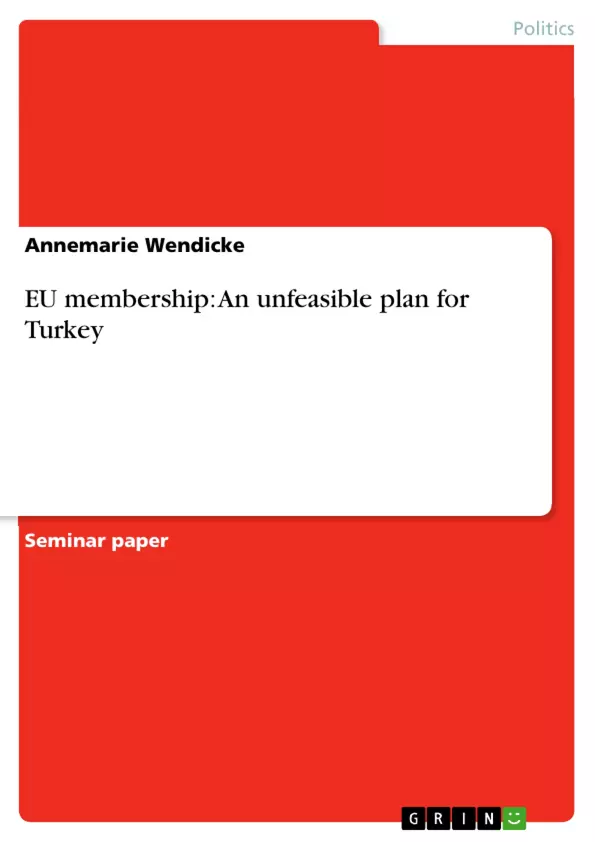Turkey has been trying to become a full member of the European Community since 1963, when an associate agreement was signed. It was one of the countries that established the OECD, an organization that represents democracy and free market economy. In 1995 Turkey started a customs union with the EU, which was the first step toward a full membership of the EU. At the European Council in Helsinki, Turkey was considered as a potential candidate for full membership of the EU. According to the European Council (2003), “Turkey is a candidate state destined to join the Union on the basis of the same criteria as applied to other candidate states.” As mentioned in the statement, the European Union is willing to offer Turkey a full membership as long as they fulfill the criteria for membership provided by the European Commission. In other words, Turkey has to share “the values, objectives and legal order set out in the [EU] treaties.” Therefore, the EU developed a pre-accession strategy for Turkey and agreed on an accession partnership on the same basis as the other candidate countries, which negotiated a treaty with the EU. For that reason, Turkey was allowed to participate in certain EU programs and meetings among the member states of the EU and the candidate states.
Although formal discussions have taken place since 2005, the member states have not reached an agreement yet. Turkey’s EU accession is the leading controversy among the member states of the EU concerning the enlargement of the European Union. Some member states are in favor of Turkey’s EU membership due to its geographical location, which could be a benefit for the European Union; whereas other countries are concerned about the situation within Turkey and its effects on the European community. Turkey should not become a full member of the European Union because of a violation of human rights based on Turkey’s ideology, security reasons, and the financial risk for the economy of the European Union. Consequently, a privileged partnership would be more appropriate.
Inhaltsverzeichnis (Table of Contents)
- Introduction
- Literary Review
- Discussion
- Ideology
- Economy
Zielsetzung und Themenschwerpunkte (Objectives and Key Themes)
This paper examines the feasibility of Turkey's EU membership, arguing against it based on several key considerations. The author explores the complexities surrounding Turkey's accession, analyzing potential benefits and drawbacks for both Turkey and the European Union.
- Turkey's ideology and its compatibility with EU values
- Security concerns and the potential impact of Turkey's membership on EU stability
- Economic implications of Turkey's accession and the potential strain on EU finances
- The role of religion and cultural differences in the EU context
- The relationship between Turkey and Cyprus as a significant obstacle
Zusammenfassung der Kapitel (Chapter Summaries)
- Introduction: This chapter provides an overview of Turkey's long-standing aspiration to join the EU, tracing the historical context of its pursuit of membership and highlighting the ongoing debate surrounding its accession.
- Literary Review: This chapter presents various perspectives on Turkey's potential EU membership, drawing on scholarly works that address key issues such as human rights, economic challenges, and the Cyprus conflict. It examines the arguments of prominent authors like Hemerijck, Mango, Hökman, and Tiersky, showcasing their diverse viewpoints on the topic.
- Discussion: This chapter delves into the core arguments against Turkey's EU membership, focusing on its ideological incompatibility with EU values, security concerns, and the potential economic burden on the EU. It examines the religious context, highlighting the differing views on Islam and its potential impact on EU identity. The chapter also explores the Cyprus issue as a major point of contention.
Schlüsselwörter (Keywords)
The key terms and concepts in this paper include Turkey's EU membership, accession criteria, human rights, religious freedom, economic development, financial implications, security concerns, Cyprus conflict, and cultural diversity.
Frequently Asked Questions
Why does the author argue against Turkey's full EU membership?
The author cites violations of human rights, security concerns, and potential financial risks to the European Union's economy as primary reasons.
What alternative to full membership is proposed?
The paper suggests that a "privileged partnership" would be more appropriate than full EU membership for Turkey.
What are the criteria for Turkey to join the European Union?
Turkey must fulfill the "Copenhagen criteria," which include sharing the values, objectives, and legal order set out in the EU treaties.
How does the Cyprus conflict affect the accession process?
The relationship between Turkey and Cyprus is identified as a significant political obstacle to reaching an agreement among member states.
What role does religion play in the discussion?
The paper explores cultural and religious differences, specifically the impact of Islam on the identity and community values of the European Union.
- Quote paper
- Annemarie Wendicke (Author), 2008, EU membership: An unfeasible plan for Turkey, Munich, GRIN Verlag, https://www.grin.com/document/91512



